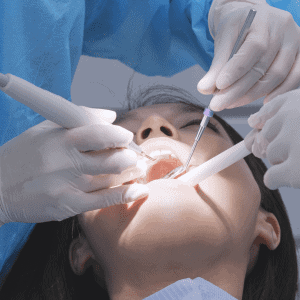Dental and oral health allows you to feel safe for your own general and social health. Poor oral health can lead to tooth decay and gum disease. Apart from that, it can be connected to heart disease, cancer, and diabetes.
To protect your dental and oral health you need to maintain lifelong care for them. The sooner you learn proper oral hygiene habits, such as brushing and flossing your teeth, and reducing the amount of sugar consumption, the sooner you can avoid costly dental treatments and long-term health problems.
Some Facts About Dental and Oral Health (Based on The World Health Organization)
- 60% of the school children have at least one dental cavity.
- Approximately 100% of adults have at least one dental cavity.
- 15% to 20% of adults between ages 35 to 44 have serious gum disease.
- About 30% of people worldwide aged 65 to 75 have no natural teeth left.
- In most countries, there are between 1 to 10 cases of oral cancer per 100,000 people.
- The number of oral diseases is much higher among poor population groups.
There are many ways to protect your teeth and oral health. Dental and oral disease can be highly reduced by:
- Brushing your teeth at least twice a day
- Flossing your teeth at least once a day
- Reducing the consumption of sugary products
- Paying attention to the fruits and vegetables consumed
- Avoiding tobacco products
Symptoms of dental and mouth problems
You shouldn’t only have a dental problem to visit a dentist. Going to the dentist on a regular basis at least twice a year usually helps to catch the problem before any symptoms appear.
You should definitely visit your dentist if you experience any of the following symptoms:
- In case there are sores or sensitive areas in the mouth that do not heal in one or two weeks.
- Bleeding or swelling of the gums while brushing or flossing
- Chronic bad breath
- Sudden sensitivity to hot or cold drinks
- Pain in the jaw structure or toothache
- Pain while chewing or biting
- Face or cheek swelling
- frequent dry mouth
If you have constant headaches and high fever symptoms, including these symptoms, we recommend you to visit your dentist immediately.
The Causes of Dental and Oral Disease
The mouth can contain all kinds of bacteria, viruses, and fungi. Some of them should already be there but they are in small quantities and they are harmless. A diet with a high amount of sugar provides the condition for acid-producing bacteria to thrive. The produced acid dissolves the tooth enamel and causes dental cavities.
When you do not brush or floss regularly, plaque builds up on your teeth and continues to cover all over your teeth from top to bottom. This condition can lead to gingivitis after it is at an advanced level.
The increased inflammation creates a small space between your gums and your teeth, and pus will be collected in this space. This stage of gum disease is called periodontitis.
There are many factors that contribute to this disease:
- smoking cigarettes
- wrong brushing habits
- Frequent consumption of sugary foods and beverages
- Diabetes
- The use of medications that reduces the amount of saliva in the mouth (For example Anti-anxiety drugs)
- Genetic disorders or disease
- HIV & AIDS
- Hormonal changes in women
- Reflux and heartburn
- Frequent vomiting due to acid
Diagnosis of Dental and Oral Disease
Most dental and oral health problems can be diagnosed during a dental exam. The areas that your dentist should look at during the examination:
- Teeth
- Mouth
- Throat
- Lounge
- Cheeks
- Jaw
- Neck
Your dentist may touch various areas with instruments to diagnose the problem. An X-ray of your mouth may need to be taken. If you are pregnant you should let your dentist know because, for example, you should not take an X-ray during pregnancy due to the harm that radiation can cause.
What is Dental and Oral Diseases?
We use our teeth and mouth a lot. As a result, if you do not take the necessary care of your teeth and oral health, it will not be very surprised if many problems arise over time. Most dental and oral problems can be prevented with simple hygienic care that you can take in daily life. People may at least experience one dental or oral health problem throughout their lives.
- Dental Caries
Cavities are also called dental caries. These are areas of the tooth that have been permanently damaged or holes have been formed. It occurs when bacteria, food, and acid coat your teeth and form a plaque. The acid in your teeth begins to eat away the underlying dentin or the connective tissue, and this can cause permanent damage over time.
- Gum Disease (Gingivitis)
Inflammation of the gums. In general, gingivitis is the result of bad brushing habits or not flossing. Moreover, after a gingivitis problem occurs, it can cause bleeding and wounds when brushing your teeth or while using dental floss. If gingivitis is not treated, it can cause periodontitis, which is a much more advanced problem.
- Periodontitis
If the periodontitis problem progresses, it may spread to your jaw and bones. It can also cause inflammation which is another disease.
- Sensitive Teeth
If you have sensitive teeth, you may experience pain or discomfort after consuming cold or hot drinks and foods. Tooth sensitivity may occur after some dental treatments. Tooth sensitivity may sometimes occur after a root canal and filling treatments.
- Oral Cancer
Tobacco use, like smoking or chewing tobacco, is the biggest risk factor for oral cancer. Like every other cancer, early diagnosis of oral cancer is very important.
The link between dental and oral health with general health
According to research, oral bacteria and inflammation may be a result of :
- Heart disease
- Endocarditis or inflammation of the pericardium
- Early birth
- Low birth weight

Treatment of dental and oral health problems
Even if you think that you are very careful about your dental and oral health, it is recommended that you visit your dentist every 6 months and have your teeth cleaned. If you have gum disease or any similar problem, your dentist will suggest a different type of treatment.
Hygiene
A professional dental cleaning process; can save you from plaque that you may have missed while brushing or flossing your teeth. This includes tartar. These cleanings are usually done by a dental hygienist.
Fluoride Treatments
After a professional cleaning, your dentist may apply fluoride therapy to combat cavities. Fluoride is a naturally occurring mineral that helps strengthen the enamel of your teeth and make them resistant to bacteria.
Antibiotics
If you are showing any signs of gum infection, antibiotics will help you with this. Antibiotics can be in the form of mouthwash, gel, or oral tablets or capsules. The antibiotic gel may be applied to the teeth or gums during some surgical procedures.
Dental fillings, Sealants and Crowns
Filling is applied for repairing any gap in the tooth. Filling is usually with the materials such as amalgam or composite.
In case if a large part of your tooth is broken, crowns will be used. There are two types of crowns; One is used on top of your natural tooth and one goes on top of the implant. Both types of the crowns cover the gaps in the tooth. Tooth fillings are made in order to restore the function of a decayed or damaged tooth.
Root Canal Treatment
If the tooth decay has gone further and it has reached the nerves. The main purpose of root canal treatment is to keep the bone structure of the teeth while actually removing the dead tooth.
Changing Daily Habits
You may have to change your daily current routine to protect your dental and oral health. Instead of saying it’s late, you can start from today. You can learn how to protect your tooth in a better way by consulting with your dentist.
Surgical Solutions for Dental and Oral Problems
However, surgical solutions can be applied in very serious periodontal disorders.
Flap Surgery
If there is infection in your gum, the main purpose of this surgery is to remove the infection bags that have formed under the teeth. To reach these bags there will be some incisions applied to the gum. Through the incision the diseased tissues are removed and cleaning is performed on the roots of the tooth.
Dental Bone Graft
When the gum disease damages the root bones of the tooth it needs to be repaired. It will be replaced with a graft bone, it can be formed from the person’s own bone, a synthetic bone or a donated bone.
Soft Tissue Grafts
Soft tissue grafts are used to treat gingival recession. The dentist may take a small piece of tissue from your mouth and attach it to the missing area of your gum.
Tooth Extraction
In case that the tooth couldn’t be saved by root canal or any other tooth operation, that tooth needs to be extracted.
Dental Implants
Dental implants are used to replace the missing tooth that has been lost, that can be as a result of an illness or an accident. Please click here for more detailed information.



